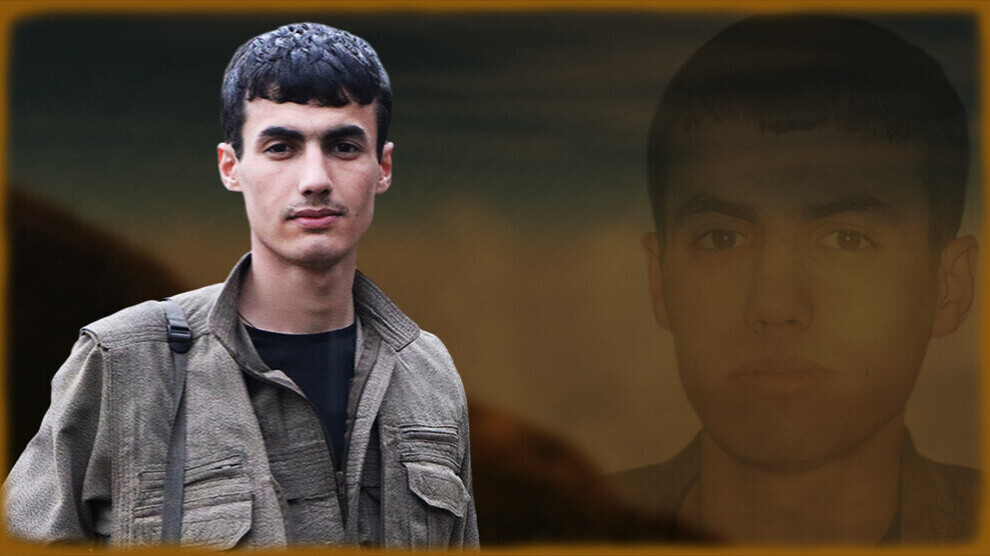HPG pays tribute to guerrilla Welat Alikî
Around six months after his violent death, presumably from chemical weapons, the identity of a guerrilla who died in Mardin has been established. The guerrilla was Welat Alikî from Rojava.
Around six months after his violent death, presumably from chemical weapons, the identity of a guerrilla who died in Mardin has been established. The guerrilla was Welat Alikî from Rojava.

Around six months after his violent death, the identity of a guerrilla who died in Mardin (Mêrdîn) has been established. The People's Defense Forces (HPG) announced in a statement that he was Welat Alikî. The guerrilla, born in Qamishlo in Northern and Eastern Syria, belonged to a unit of three who were killed in December last year during a Turkish military operation on the Bagok massif in Nusaybin (Nisêbîn) south of Mardin. However, their bodies were so disfigured that their identities could only be determined by comparing their DNA with relatives. In the case of the other two fighters, Demhat Amed and Argeş Bagok, this was already done successfully in January. Because of the state of the bodies, the relatives had the suspicion that the guerrillas may have died as a result of the use of banned chemical weapons.
Because Welat Alikî was a Syrian citizen, the identification process in his case took months. The HPG praised him as a selfless and courageous defender of the values of freedom who represented the militancy of the Kurdish liberation movement until the end. The organization expressed its condolences to his relatives and the people of Kurdistan. The HPG provided the following information about the martyr's personal details:
 Code name: Welat Alikî
Code name: Welat Alikî
First and last name: Raman Celal
Place of birth: Qamishlo
Mother's and father's names: Mutîa - Lokman
Date and place of death: 27 December 2023 / Mêrdîn
Welat Alikî was born in Rojava, but came from a nomadic family originally based in the northern Kurdish province of Siirt (Sêrt), who first settled in Nusaybin (Nisêbîn) and later moved to Qamishlo. Qamishlo and Nusaybin, formerly a single region, are a small reflection of divided Kurdistan. This is where the reality of Binxet and Serxet becomes particularly clear. Binxet, meaning "below the line", is used to refer to Kurdish areas in Syria near the Turkish border. The Kurdish areas located on Turkish territory in the immediate vicinity of the Syrian border are called Serxet, which means "above the line". After the end of the First World War, the French mandate territory of what is now Syria was separated from the Ottoman Empire in the early 1920s. The border with what is now Turkey runs along the railway line in this area. This separated Qamişlo and Nisêbîn.
The reality of Binxet and Serxet led Welat Alikî to recognize the contradictions of the system at an early age. At school, he was also confronted with the anti-Kurdish racism of the Baath regime, which is embedded in Arab nationalism. The stable parental home, which did not turn away from the Kurdish identity despite omnipresent repression, probably played just as big an indicator as his own strong personality, preserving his own culture and using the Kurdish identity as an antidote to the world of oppression.
Politicized early in his home, Welat Alikî developed the desire to get involved in the Kurdish resistance as a young adolescent. The Rojava revolution did not make it difficult for him to find a way. But when mercenaries began pouring into Syria and Iraq in their tens of thousands from all over the world in 2013 to live in the "caliphate" of the Islamic State, not only the revolution but the entire population was threatened. To protect them, Welat Alikî joined the Rojava defense forces that same year. He spent two years in northern Syria and in the main Yazidi settlement area of Şengal in northern Iraq, where he took part in various offensives against the mercenaries to protect the Yazidis, who had been almost wiped out by ISIS in August 2014.
From Shengal, Welat Alikî went to the guerrillas in the mountains. The fact that he later joined the guerrillas in North Kurdistan of his own free will was to fight against the isolation of PKK founder Abdullah Öcalan in Turkey's Imrali prison and the numerous victims of the resistance for democratic autonomy during the Turkish military siege in the winter of 2015/2016. His motto was that this ideal could only be achieved in North Kurdistan. He considered the Bagok massif in Nusaybin, the homeland of his ancestors, to be his home. That is why he repeatedly expressed his wish to fight where his family's traces lie.
"We have fulfilled our friend's wish," said the HPG. "Hevalê Welat managed to live out his wish until 27 December 2023. Together with Argeş and Demhat, he courageously offered selfless resistance against the enemy. They fought until the last moment and joined the caravan of the fallen. Our solidarity goes out to them and to the promise to achieve the ideals of all our friends and to liberate Kurdistan from the occupiers."